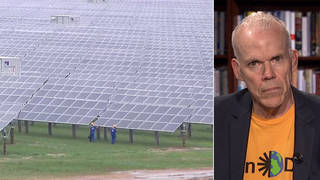
Guests
- Joseph Gouzdpresident of United Steelworkers of America Local 8-957.
- Katherine Ebaninvestigative journalist and contributing editor at Vanity Fair.
More than 1,400 workers in West Virginia are set to lose their jobs this week when the Viatris pharmaceuticals plant in Morgantown shuts down and moves operations overseas to India and Australia. Workers say they’ve had no response to their urgent requests for help from their Democratic senator, Joe Manchin, who is often called the most powerful man in Washington. Viatris was formed through a merger between two pharmaceutical companies, Mylan and Upjohn. Mylan’s chief executive, Manchin’s daughter Heather Bresch, got a $31 million payout as a result of the corporate consolidation before the new company set about cutting costs, including the closure of the Morgantown plant. Joseph Gouzd, president of United Steelworkers of America Local 8-957 and a worker at the plant, says Viatris has given little reason for the closure except to say the company is looking to “maximize the best interests of the shareholders.” We also speak with investigative journalist Katherine Eban, who says moving pharmaceutical production overseas contradicts the recommendations of numerous reports that have found major safety lapses in drug manufacturing abroad, as well as concern from lawmakers about keeping a key industry within the United States. “This is pure insanity,” Eban says. “It seems like it is both pharmaceutical and national security suicide to close this plant.”
Transcript
AMY GOODMAN: This is Democracy Now!, democracynow.org, The War and Peace Report. I’m Amy Goodman in New York, with Juan González in New Jersey, as we turn to West Virginia, where more than 1,400 workers are set to lose their jobs this week when Viatris pharmaceuticals plant in Morgantown shuts down and moves operations overseas to India and Australia.
Workers say they’ve had no response to their urgent requests for help from their senator, Democratic Senator Joe Manchin, who’s often called the most powerful man in Washington.
The Viatris plant in West Virginia has been making pharmaceuticals since 1965 and was run by Mylan until a merger last November with Pfizer’s Upjohn Company, which created the conglomerate Viatris.
VIATRIS AD: In a world that is perpetually changing, there is increasing need for steady leadership, companies demonstrating the courage to address the world’s emerging healthcare challenges with passion and compassion. Viatris is redefining the healthcare landscape.
AMY GOODMAN: When Viatris was created, Mylan’s chief executive, Senator Manchin’s daughter, Heather Bresch, got a $31 million payout. During her time as CEO, Bresch drew outrage when the company raised the price of its life-saving EpiPen, used by millions to reverse fatal allergic reactions, when they raised the price by 400%.
After the merger, Viatris immediately began to cut costs, and now the plant is set to close on Friday. Some workers have already been told to clear out their lockers and leave the site after turning in their employee badges. This is Carla Shultz, who worked at the plant for 13 years and was able to get chemotherapy drugs for her mother through her job. The same medicine would otherwise cost her family $7,000 a month. She spoke to The Laura Flanders Show.
CARLA SHULTZ: I had to look at my mom, who had had major health issues over the 13 years, and tell her that, you know, I’m not going to have a job after July. And she knew I was getting her medicine there, too. And, “What about my medicine? You know, what about” — and then she had to start worrying about, of all things — you know, we want to keep her positive and keep her healthy. And I had to break that news to her. That was tough. It really was.
I’m just a year or two away from retirement, so I’m too old to go to school, I feel. And I don’t know. I need to be here in the daytime to care for my mom, so I might have to try to find another midnight shift job, that, you know, is not going to pay as well, of course, and probably not going to have the benefits.
AMY GOODMAN: That’s Carla Shultz, who works at the Viatris pharmaceuticals plant, now set to close during a pandemic, that has shown how much the U.S. needs to expand its domestic drug production.
For more, we go to Morgantown, West Virginia, to speak with Joseph Gouzd, who worked at the plant and is president of the United Steelworkers of America Local 8-957, which represents hundreds of workers there. Also with us, Katherine Eban, investigative journalist, author, contributing editor at Vanity Fair. Her new piece is headlined “'We Can’t Reach Him': Joe Manchin Is Ghosting the West Virginia Union Workers Whose Jobs His Daughter Helped Outsource.” She’s also author of the book Bottle of Lies: The Inside Story of the Generic Drug Boom and Dangerous Doses: A True Story of Cops, Counterfeiters, and the Contamination of America’s Drug Supply.
We welcome you both to Democracy Now! Joe Gouzd, can you talk about what’s happening at the plant right now in supposedly these final days of its operation?
JOSEPH GOUZD: Good morning. Thanks for having me this morning.
Currently, the majority of the workers have been allowed to clean out their lockers — or, told to, rather, clean out their lockers, take their personal belongings and leave the facility and, upon exiting the facility, turn in their badge, their access badge, to the plant, and also their parking permit. This started approximately 11 a.m. on Sunday, and it ran through yesterday. In fact, it’s probably even taking place in minimal increments now, since the majority of the members have been flushed out by management and told to exit the facility.
JUAN GONZÁLEZ: And, Joseph Gouzd, I wanted to ask you: What did the company tell the union? First of all, did they give them the 90-day WARN notice that they have to do in shutdowns like this? And also, they can’t be saying that they’re not making money. If any industry is making money these days, it’s the pharmaceutical industry. So, what was the reason they gave you for shifting production overseas?
JOSEPH GOUZD: The WARN Act was filed according to dated deadlines, as per the regulations required.
The other situation that you asked about is what did the company say. Well, the merger took place in November of 2020. December the 11th of 2020, on a Friday, a payday Friday, two weeks — exactly two weeks before Christmas, we were on an all-inclusive employee phone call. The officers had a phone call 15 minutes prior to that here at the union hall. We were told approximately seven minutes before the all-inclusive employee phone call that Viatris had made a decision to synergize and close the Morgantown facility. Profitability and things of that nature weren’t really discussed, but there was a lot of mention of the future interest of the shareholders and the investors and trying to, quote-unquote, “downsize” to maximize the interest, the best interest, of the shareholders and the stakeholders in Viatris, the new company.
JUAN GONZÁLEZ: And I would have to assume that as pharmaceutical jobs, unionized pharmaceutical jobs, the pay is above average, certainly for West Virginia. Could you talk about what kind of salaries were these workers — had these workers been taking home, and what kind of replacement jobs are available at that level in West Virginia?
JOSEPH GOUZD: We ratified a contract in the spring of 2017. It’s fair to say, on a very modest estimate, that the cross-section was approximately $30 to $31 an hour at that time, when the contract was ratified. And then there’s upwards of about 80 cents a year in terms of an incremental raise on an annual basis.
The job market in Morgantown, West Virginia, at this time, for example, there are Lowe’s, which is a home improvement center, and Home Depot, a home improvement center, a little bit of West Virginia University Medicine and such. It seems as if the cross-section is basically around $17 to $18 an hour. And that’s about an average.
AMY GOODMAN: I want to bring Katherine Eban into this conversation. The piece you wrote in Vanity Fair, “'We Can't Reach Him’: Joe Manchin Is Ghosting the West Virginia Union Workers Whose Jobs His Daughter Helped Outsource.” Can you give us the big picture here? I mean, we are talking about one of the largest generic drug manufacturing plants in the United States closing this week — this week, which the Biden administration, the White House, has declared “Made in America Week.” You have a precedent in Tennessee of a similar plant that the Biden administration has stopped from closing. Can you explain the history here?
KATHERINE EBAN: Absolutely. Good to be with you, Amy and Juan. Thank you for having me again.
So, this is pure insanity. We have seen five years of congressional reports, policy reports and bipartisan agreement that we need to make as many of our own pharmaceuticals as possible. We know from data, from reporting, that the drugs that are made overseas can be full of carcinogens and toxic impurities. There is all kinds of data fraud and other quality questions that the plants overseas are riddled with, including Viatris’s own plants, which are operating in India under an official action indicated warning from the FDA. So, why, in the middle of a pandemic, are we going through this exercise that every single report has told us is absolutely counterindicated to public health and our national interest?
It seems that there is a collision here of politics and corporate greed. We’ve seen massive payouts to the Viatris executives in the course of this merger, including, as you noted, over $30 million to Joe Manchin’s daughter, Heather Bresch, who is the former CEO of Mylan, the company that merged with Upjohn. And, you know, Manchin has become this pivotal figure, called by some the most powerful man in Washington, D.C., and the only thing that is standing between this whisker-thin Senate majority for the Democrats and Senator McConnell taking up the gavel again. So, there is this sort of cone of silence that has come down over this shuttering of this critical manufacturing plant in West Virginia. It seems like it is both pharmaceutical and national security suicide to close this plant.
JUAN GONZÁLEZ: And, Katherine, could you talk about Manchin’s daughter’s history there — Heather Bresch — with the company and previous scandals or controversies she’s been involved with?
KATHERINE EBAN: Yeah. Well, what’s really remarkable about the executive team that ran Mylan over the last decade is that their compensation has just gone up and up. There was one year in which Heather Bresch’s payout was $25 million, in 2014. Pay has gone up and up, even while there has been this steady drumbeat of scandals, as well as regulatory run-ins with the FDA.
So, you know, her tenure at Mylan began with this scandal in which it turned out that she had been given, awarded an MBA from West Virginia University on the basis of doctored transcripts, when she didn’t do the coursework. That MBA had to be revoked. It was awarded right after Manchin became governor, that he was before senator.
Then there was, as you noted, the scandal around the EpiPen pricing, in which the price was jacked up 400%. Under Bresch’s management, it was handled disastrously. You know, she sort of pulled a Marie Antoinette on national television, saying, “Nobody is more upset about this than I am,” but everybody rightly noted that her compensation has just skyrocketed as Mylan CEO.
Then, once the Morgantown plant got into regulatory trouble with the FDA, based on the kinds of data manipulation that some of the executive team had been notably involved in in their previous employment, they looked to wind down the Morgantown plant. But the people who are really going to suffer here are American consumers. We need safe medication, affordable medication, and medication made within inspection distance of FDA headquarters. That’s what the Morgantown plant offered for, I think, something like five decades.
AMY GOODMAN: This is then —
KATHERINE EBAN: And now —
AMY GOODMAN: This is then-Mylan CEO Heather Bresch, daughter of Senator Joe Manchin, then-head of the lobbying group the Generic Pharmaceutical Association, blamed the price hike on a broken healthcare system during a disastrous interview with CNBC’s Brian Sullivan.
BRIAN SULLIVAN: Surely, you must understand the outrage. As somebody I talked to last night said, people are outraged because it seems outrageous, that the American Medical Association has said this is basically the same product it was in 2009, and yet the price has gone up 300- or 400-fold.
HEATHER BRESCH: So, the — look, no one is more frustrated than me. I’ve been in this business for 25 years —
BRIAN SULLIVAN: But you’re — you’re the one raising the price, though. How can you be frustrated?
AMY GOODMAN: That’s then-Mylan CEO Heather Bresch, who went on to lie to a congressional committee when she said the profit off a two-pack of EpiPens is $100, when it was actually $166, about 60% higher. That’s because Bresch cited a profit figure that included a 37.5% tax rate on the EpiPen, even though Mylan paid a tax rate of just 7% that year. An analyst told The Wall Street Journal that $100 reported profit figure “has nothing to do with reality.”
But I wanted to ask you, Katherine Eban, about this Tennessee plant, because this is where Joe Biden weighs in. I mean, when you talk about President Joe, some people in Washington think you mean Joe Manchin because of his power there. What happened in Tennessee? And what could Biden do here? And then we’ll talk to the union leader about whether he’s spoken to Manchin. Where is he on this? But, Katherine, begin.
KATHERINE EBAN: Yeah. So, there was a really interesting Hail Mary rescue of an antibiotic plant in Tennessee. It was purchased — it was essentially about to be mothballed. It was purchased for a dollar by a U.K. company, who sent a guy named David Argyle to the Tennessee antibiotics plant to say, “Hey, is this plant viable? What did we buy?” He got there. He saw this incredible esprit de corps among the workers and among the management. You know, they had a critical mission, which was making antibiotics, amoxicillin, for the U.S. market.
So, Argyle got creative. And he’s Australian. What he did, he placed the plant into Chapter 11 bankruptcy. Then he — working with Tennessee elected officials, he got the plant designated as critical infrastructure, under a federal agency called CISA, which is Cybersecurity Infrastructure — Cyber Infrastructure Security Agency [Cybersecurity and Infrastructure Security Agency], got it designated as critical infrastructure. And then, working with a team, he found an American buyer for it. And now the U.S.A. has an antibiotics plant. You know, at a time when almost 100% of our penicillin is made overseas, we now have a functioning antibiotics plant in the U.S.
So, what could be done at Morgantown? The Biden administration could designate the plant as critical infrastructure, which would stop its equipment and its intellectual property from going overseas. They could come in and rescue it under the Defense Production Act and get government involvement in the plant in order to save it. But the question is: Why, in the middle of a pandemic, when it has been clearly revealed that there has been supply chain crisis after supply chain crisis, would the Biden administration let this plant slip through America’s fingers right now?
AMY GOODMAN: We’re going to continue this conversation after break. We’re talking to Katherine Eban, Vanity Fair writer, who’s asking where Joe Manchin is in all of this, the piece, “'We Can’t Reach Him': Joe Manchin Is Ghosting the West Virginia Union Workers Whose Jobs His Daughter Helped Outsource.” And we’ll continue talking to Joe Gouzd, who is the local chapter president of the union, USW Local 8-957. Stay with us.
[break]
AMY GOODMAN: “Wider Circles” by Rising Appalachia. This is Democracy Now! I’m Amy Goodman, with Juan González. We’re speaking with Joseph Gouzd, works at the Viatris plant in Morgantown. He’s president of the USW Local 8-957, represents workers there. Almost 1,500 workers are set to lose their jobs by the end of this week. Katherine Eban is with us, of Vanity Fair, wrote the piece, “'We Can’t Reach Him': Joe Manchin Is Ghosting the West Virginia Union Workers Whose Jobs His Daughter Helped Outsource.” Juan?
JUAN GONZÁLEZ: Yes. Katherine, I wanted to ask you — Heather Bresch, Joe Manchin’s daughter, is not the only person who’s, to some degree or other, family member that benefits from the power and influence that Joe Manchin has. Could you talk about his wife, as well, Gayle Conelly Manchin? She was recently sworn in as co-chair of the Appalachian Regional Commission, at a $163,000-a-year job. And that commission is supposed to promote economic development. So, how is the closing of a plant, shifting it overseas, helping the economic development of West Virginia?
KATHERINE EBAN: Yeah, the ironies are really thick here. And it seems to be that this Mylan plant in Morgantown has been used as a kind of family enterprise prior to this. So, Gayle Manchin plays a cameo role in the EpiPen scandal, actually, because she was on a school commission that was trying to get the U.S. government to mandate that schools purchase the EpiPen, when it was at that inflated price. You know, so the approach to this pharmaceutical manufacturing has been to sort of milk this plant and its products for profit, which has benefited the Manchin family and benefited shareholders, but not benefited American patients to this point.
JUAN GONZÁLEZ: And, Joe Gouzd, could you talk about your efforts to try to reach Senator Manchin about this issue? And what kind of response have you gotten from him or his staff about the fact that all of these workers in his state are losing jobs?
JOSEPH GOUZD: That’s a really intriguing question for Local 8-957 in Morgantown. We had a March 10th fly-in with several Senate aides and senators that accompanied us and accepted our calls. Senator Manchin, through his aides, was patched through to our call at approximately 12:30 p.m. on March the 10th. We were told that he was on the Senate floor voting. And he acknowledged and picked up the phone and said, “Hey, guys, the news is catastrophic, and we’re sorry about your luck to hear of the plant closing. It sounds like they’ve made a corporate decision.”
But prior to that, as Katherine alluded to earlier — and I want to go back to a statement she made — the majority of penicillin and such is made outside of the domestic United States of America. But Joe Manchin’s first question to us was — and I was on the call with four other officers at the union hall at the same time: “Are you all still making penicillin at the facility?” We haven’t made penicillin in Morgantown, West Virginia, for more than 20 years.
AMY GOODMAN: So, he was speaking to you from the floor of the Senate? How long was that call, and what did he say?
JOSEPH GOUZD: Approximately two minutes, maybe two to three minutes. And I use the word “approximately.” But his first question was: “Sorry, guys, hate to hear the news. Are you all still making penicillin at that facility? And also, are you a batch production site? It sounds like corporate has made a decision to close the facility. I’m not so sure there’s anything left that I can do. We’ll try to help, but I’m not so sure there’s anything left that I can do.”
In the meantime, the gentleman had asked me a question about what we had done to try to circumvent around Senator Manchin’s comments and maybe get or try to embark on a little bit more of an engagement conversation from the senator. We have spoken to Andrew Robinson in the Fairmont office. We had spoken to Andrew Robinson more than one occasion, asking for and inquiring about a meeting with Senator Manchin. Andrew Robinson has never told us or responded to us to let us know that we could not have a meeting with Senator Manchin.
AMY GOODMAN: Joe, we’re going to have —
JOSEPH GOUZD: We then —
AMY GOODMAN: We’re going to have to leave it there. Five seconds?
JOSEPH GOUZD: We went on to Anna Engle in Washington, D.C., at his other office, requesting meetings, and never received a response there, either.
AMY GOODMAN: Well, Joseph Gouzd works at the Viatris plant, set to close Friday, in Morgantown, West Virginia, president of the United Steelworkers Local 8-957 that represents workers there. And thanks to Katherine Eban, contributing editor at Vanity Fair. Her piece, we’ll link to, “'We Can’t Reach Him': Joe Manchin Is Ghosting the West Virginia Union Workers Whose Jobs His Daughter Helped Outsource.” I’m Amy Goodman, with Juan González.












Media Options